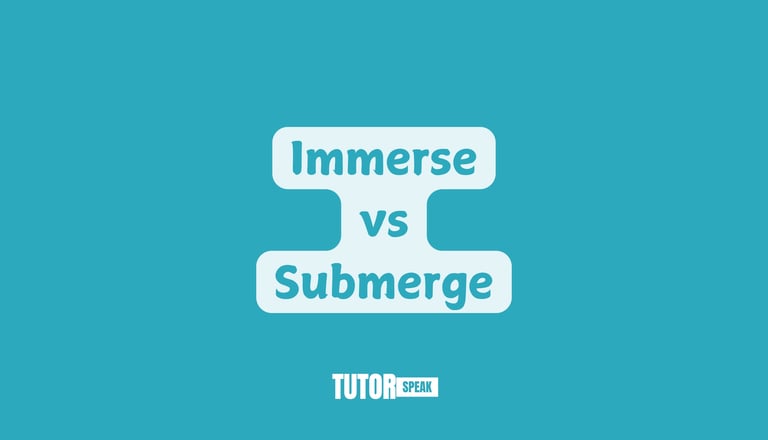Immerse vs. Submerge: Understanding the Difference and Usage
When learning English, understanding similar words like "immerse" and "submerge" can be tricky. These words share some similarities but are used in distinct contexts. In this article, we’ll explore the meanings, differences, and proper usage of "immerse" and "submerge," along with examples to help you master them.
TutorSpeak
12/14/20242 min read


Immerse vs. Submerge: Understanding the Difference and Usage
When learning English, understanding similar words like "immerse" and "submerge" can be tricky. These words share some similarities but are used in distinct contexts. In this article, we’ll explore the meanings, differences, and proper usage of "immerse" and "submerge," along with examples to help you master them.
What Does "Immerse" Mean?
The term "immerse" refers to two main ideas:
Literal meaning: To place something fully into a liquid.
Figurative meaning: To deeply engage or involve oneself in an activity, subject, or experience.
Examples:
Literal: "Immerse the vegetables in boiling water for three minutes."
Figurative: "She immersed herself in her studies to prepare for the final exam."
When used figuratively, "immerse" conveys the idea of being fully absorbed or focused, often in a positive or enriching way.
What Does "Submerge" Mean?
The word "submerge" is primarily used in a literal sense to describe something being completely covered by a liquid, usually water. It does not typically have a figurative meaning like "immerse."
Examples:
The submarine slowly submerged beneath the surface of the ocean.
The floodwaters submerged the entire village after the heavy rain.
Unlike immerse, submerge often implies a sense of being hidden or overwhelmed by water or another liquid.
Key Differences Between "Immerse" and "Submerge"
Meaning:
Immerse: Can be both literal and figurative.
Example: "Immerse yourself in the culture to learn the language faster."Submerge: Only used in a literal context.
Example: "The diver submerged completely under the water."
Context:
Immerse: Often associated with involvement or engagement, especially in a non-physical sense.
Submerge: Typically used in physical contexts to describe something being covered by liquid.
Tone:
Immerse: Positive or neutral connotation.
Example: "Immerse yourself in reading to expand your knowledge."Submerge: Can carry a negative connotation, especially in cases of flooding or accidents.
Example: "The car was submerged after the river overflowed."
Common Mistakes with "Immerse" and "Submerge"
Mixing up the literal and figurative uses:
Incorrect: "She submerged herself in her studies."
Correct: "She immersed herself in her studies."
Misusing the base verb:
Incorrect: "Immerse the clothes into the water."
Correct: "Immerse the clothes in the water."
Using "submerge" for engagement:
Incorrect: "I love to submerge myself in art."
Correct: "I love to immerse myself in art."
Exercises to Practice Immerse vs. Submerge
1. Fill in the Blanks with "Immerse" or "Submerge":
a. To cook pasta, you should _______ it in boiling water.
b. The village was _______ after days of continuous rain.
c. She decided to _______ herself in learning English by taking online courses.
d. The diver began to _______ under the surface of the water.
2. Match the Sentences with the Correct Word:
a. To deeply focus on learning a new skill.
b. To sink completely below the waterline.
c. To fully engage with another culture.
d. To be overwhelmed by rising floodwaters.
i. Immerse
ii. Submerge
3. Choose the Correct Word in the Following Sentences:
a. You should _______ yourself in English podcasts to improve listening skills.
b. The rescue workers couldn’t save the _______ vehicle from the river.
c. The museum exhibit encourages visitors to _______ themselves in history.
d. After the accident, the ship started to _______ rapidly.



